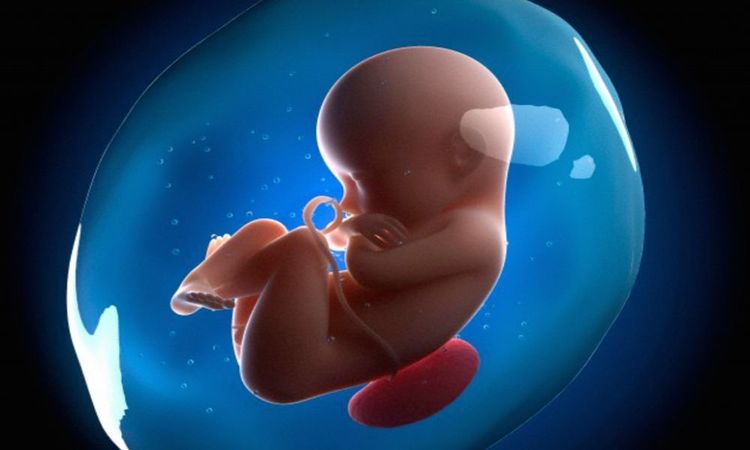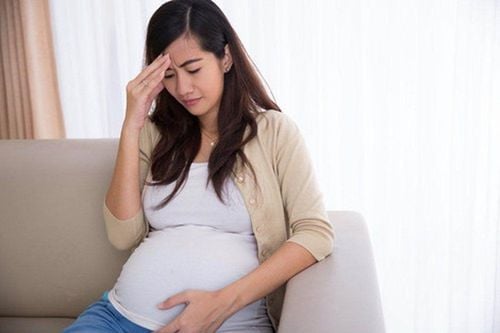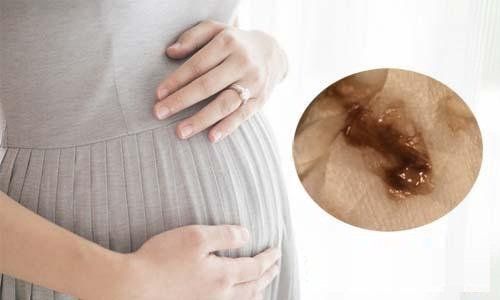By the 32nd week, pregnant women may notice the baby hiccupping frequently and for extended periods. All babies can experience hiccups, which are considered a developmental milestone in their growth. Pregnant women can feel when the baby has hiccups. If not paying close attention, mothers might mistake them for the baby’s movements.
1. Causes of Fetal Hiccups
- Abnormal Diaphragm Movement:
Just like adults, a baby in the womb gets hiccups due to abnormal movement of the diaphragm. Since the organs are not fully developed, the fetus can't balance swallowing. When swallowing, the baby inhales or exhales, pushing amniotic fluid out, which creates the hiccup sound.
- Compressed Umbilical Cord:
By the 32nd week, pregnant women may notice the baby hiccupping frequently and for extended periods. This could be due to compression of the umbilical cord, which is a dangerous cause affecting the baby's health. Umbilical cord compression can reduce oxygen supply, leading to prolonged fetal hiccups.
Mothers should go to a reputable obstetrics clinic or hospital if they notice prolonged fetal hiccups, decreased movements, or any other abnormal signs for an examination and appropriate treatment.
2. Signs of Fetal Hiccups

- Rythme: The sign is gentle jerking sensations in the lower abdomen. Mothers can feel the rhythmic movements as if the baby's heart is beating or tapping steadily. Unlike hiccups, fetal movements (in the second trimester) or the kicks in the third trimester do not have such a steady rhythm; they vary in speed and intensity and can occur in different positions depending on the baby’s arms and legs.
- Duration:
Each episode of fetal hiccups lasts about 3–15 minutes and can occur multiple times a day. While many pregnant women can feel the hiccups throughout their pregnancy, some may not recognize their baby's symptoms, which is normal. Therefore, if mothers do not feel their baby hiccuping, they shouldn’t worry. - Timing:
Hiccups can occur at any time, day or night. Pregnant women may even see their baby hiccuping through ultrasound. - Intensity:
In the second trimester, the intensity of fetal movements and hiccups can feel similar. However, in the third trimester, there is a significant difference; hiccups are gentle while movements can be very strong, sometimes showing the baby’s hands or feet against the mother's belly.
3. What Should Pregnant Women Do When Their Baby Has Hiccups?

The causes of hiccups generally do not affect fetal health, except for umbilical cord compression. If the baby’s hiccups suddenly become stronger and prolonged, combined with other abnormal symptoms, mothers should seek medical attention as soon as possible. Here are some methods to help reduce fetal hiccups:
- Keep a positive mindset and stay relaxed to support your baby’s well-being.
- Maintain a balanced diet and rest regularly.
- If the frequency of hiccups increases, mothers may try changing positions; for instance, shifting from lying flat to lying on their side, or getting up for a light walk. Changing the mother's position can help the baby feel more comfortable and reduce hiccup frequency.
Vinmec International General Hospital offers a complete maternity care program for pregnant women starting from early pregnancy, including regular check-ups, 3D and 4D ultrasounds, and routine tests to ensure maternal health and comprehensive fetal development. Mothers will receive advice and health checks under the close supervision of experienced obstetricians, helping mothers gain knowledge to protect their health during pregnancy and minimize complications for both mother and child.
- Signs of Healthy Fetal Development in the Third Trimester
- When Should You Count Baby Movements?
- Fetal Development at Week 32
To arrange an appointment, please call HOTLINE or make your reservation directly HERE. You may also download the MyVinmec app to schedule appointments faster and manage your reservations more conveniently.














